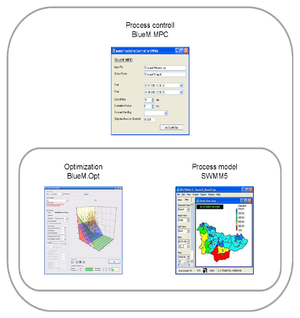BlueM.MPC application: Difference between revisions
(BlueM.MPC nav hinzugefuegt) |
(Notice for discontinuation of development) |
||
| (One intermediate revision by one other user not shown) | |||
| Line 34: | Line 34: | ||
* ''Control step.'' Length of the control horizon in minutes. | * ''Control step.'' Length of the control horizon in minutes. | ||
* ''Evaluation horizon.'' Length of the evaluation horizon in hours. | * ''Evaluation horizon.'' Length of the evaluation horizon in hours. | ||
* ''Forecast handling.'' Selection of method, that determines how the time difference between the end of the forecast and the evaluation horizon is handled (see [[ | * ''Forecast handling.'' Selection of method, that determines how the time difference between the end of the forecast and the evaluation horizon is handled (see [[BlueM.MPC theory]]). The user can choose between three methods: | ||
# Set all inflow values to zero. | # Set all inflow values to zero. | ||
# Set all inflow values to the average of the forecast horizon of the node. | # Set all inflow values to the average of the forecast horizon of the node. | ||
# Use the last value of the forecast horizon. | # Use the last value of the forecast horizon. | ||
* ''Objective function threshold.'' An optional value to speed up the simulation can be set in cases where objective functions values are minimized towards zero (which is for example the case when overflow volumes are minimized). The user defines a threshold value, which is compared in each control loop to the calculated objective function of the first simulation run. If the calculated value is smaller than the given threshold value, the iterative calculation of optimal control values is not necessary. | * ''Objective function threshold.'' An optional value to speed up the simulation can be set in cases where objective functions values are minimized towards zero (which is for example the case when overflow volumes are minimized). The user defines a threshold value, which is compared in each control loop to the calculated objective function of the first simulation run. If the calculated value is smaller than the given threshold value, the iterative calculation of optimal control values is not necessary. | ||
<div class="achtung">'''Note:''' Development of BlueM.MPC has been discontinued!</div> | |||
[[Category:BlueM.MPC]] | |||
Latest revision as of 01:21, 8 April 2018
BlueM.MPC is a modular software consisting of three modules. The supervising module BlueM.MPC coordinates work and data flow. Module SWMM5 represents the process model which is used for the evaluation of the objective function that is required by the optimization module BlueM.Opt. Data exchange between modules is based on text files.
Dataset
Application of BlueM.MPC requires seven input files:
Process control:
- XML-File: Inflow prediction
Optimization:
- OPT-Datei: Definition of optimization parameters
- ZIE-Datei: Definition of objective function
- MOD-Datei: Localization / identification of optimzation parameters in inp
Process model:
- INP-File: Definition of the process model
- TXT-File: Inflow-Data
- HSF-File: Initial flows and water levels
Simulation
After starting the application MPC.exe a user form is opened. In this form all relevant information for the process control has to be filled in. After pressing the button Init BlueM.Opt the GUI of the optimizer BlueM.Opt is launched. The user selects an optimization algorithm and after setting the relevant optimization parameters the MPC simulation will start from there.
The following informations are required in the BlueM.MPC form:
- Input File. Path and file name of the process model (INP-File).
- Output Folder. Path of the folder for results and log-files.
- Start. Date and time of the start of the MPC simulations.
- Stop. Date and time of the end of the MPC simulations.
- Control step. Length of the control horizon in minutes.
- Evaluation horizon. Length of the evaluation horizon in hours.
- Forecast handling. Selection of method, that determines how the time difference between the end of the forecast and the evaluation horizon is handled (see BlueM.MPC theory). The user can choose between three methods:
- Set all inflow values to zero.
- Set all inflow values to the average of the forecast horizon of the node.
- Use the last value of the forecast horizon.
- Objective function threshold. An optional value to speed up the simulation can be set in cases where objective functions values are minimized towards zero (which is for example the case when overflow volumes are minimized). The user defines a threshold value, which is compared in each control loop to the calculated objective function of the first simulation run. If the calculated value is smaller than the given threshold value, the iterative calculation of optimal control values is not necessary.


